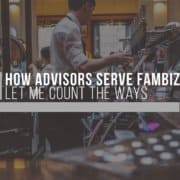|
Getting your Trinity Audio player ready...
|
Finding a Reason for Organized Family Discussions
Every week here I tackle a subject relating to families who either work together or own assets together.
The main thrust typically involves the challenges these families face in organizing themselves in ways that increase the likelihood that they’ll be able to keep a great thing going right through the next generational transition of the family.
That often means I talk about the importance of having regular family meetings and beginning to institute some forms of family governance, which is often a tough swallow for some families.
For certain families, there’s kind of a nice “back door” to this that presents itself, and that’s family philanthropy.
A Subject That’s Long Overdue Here
I’m almost embarrassed that I’ve written so little about philanthropic activities in this space, because family enterprises are often quite generous, especially in their local communities.
When I got into this field, the ideas I had around philanthropy were quite simplistic, eg. Companies makes money, so they give some of it back, that seems logical.
It was only later, when I noted that some families had found it necessary to organize their activities on a more formal basis to actually implement everything required to properly execute their giving, that I realized the wonderful side effect this can have.
The Family Governance Angle
Regular readers recognize that we are now venturing into familiar territory, i.e. family governance.
I typically lament the fact that most families seem almost allergic to the idea of implementing any form of governance, and I fully understand their reluctance.
In my first book, SHIFT your Family Business, there’s even a chapter called “Governance, Ugh!”
So one day it finally clicked, philanthropy offers some families a wonderful onramp to this world, because family giving, done right, actually necessitates many of the steps required for other types of family enterprise governance.
Philanthropy Experts Abound
The professional circles in which I travel and connect also contain philanthropy experts on a regular basis, and it is amazing how much we have in common.
On the podcast that I often host for Family Enterprise Canada, Let’s Talk Family Enterprise, I once did an episode with a colleague, Dr. Sharilyn Hale, called How Philanthropy Can Support Both Family Governance and Legacy.
Yet it still never clicked that I needed to share this idea with my blog readers. Like I said, this is long overdue.
In the organisations I belong to, including the Family Firm Institute (FFI) and the Purposeful Planning Institute (PPI), I regularly interact with professionals who work with families to support their philanthropic activities.
I guess I’m starting to realize how much we have in common.
When There’s No Operating Business (Anymore?)
One way this situation suddenly appears is right after a liquidity event, when the family realizes that now that they no longer own and operate a business together, many things are different.
See Huge Liquidity Events – Great News, Right?
Yes, they now have much more liquid wealth to handle and organize, but they’ve lost that common asset that they used to rally around and identify with, likely much more than they ever realized at the time.
How do you get a family excited about rallying around a pile of money?
Well, one answer, one that seems to be gaining in popularity, is very much centered around philanthropy.
It takes work and intention to do this well, especially if the family leaders have realized that doing this in a way that will last beyond their own lifetime, they will need to do this as a family, and not just by one or two people.
Building a Strong Foundation
Whether the specific vehicle(s) the family chooses to use include a family foundation or not, it will be important for every family to build a strong (figurative) foundation upon which they want to structure the family’s giving.
That important work includes defining the family’s values, which needs to be done pretty early on. Likewise, co-creating a vision and mission can also be important pillars that can help strengthen a coherent effort that all family members can get behind, and possibly also be involved in executing.
This will involve figuring out how they are going to communicate and make decisions together, as well as solve problems as they arise.
And as regular readers will recognize, I just laid out the key elements of family governance, right there in that last sentence.
Indeed, philanthropy offers many benefits for the family, not just for society!










